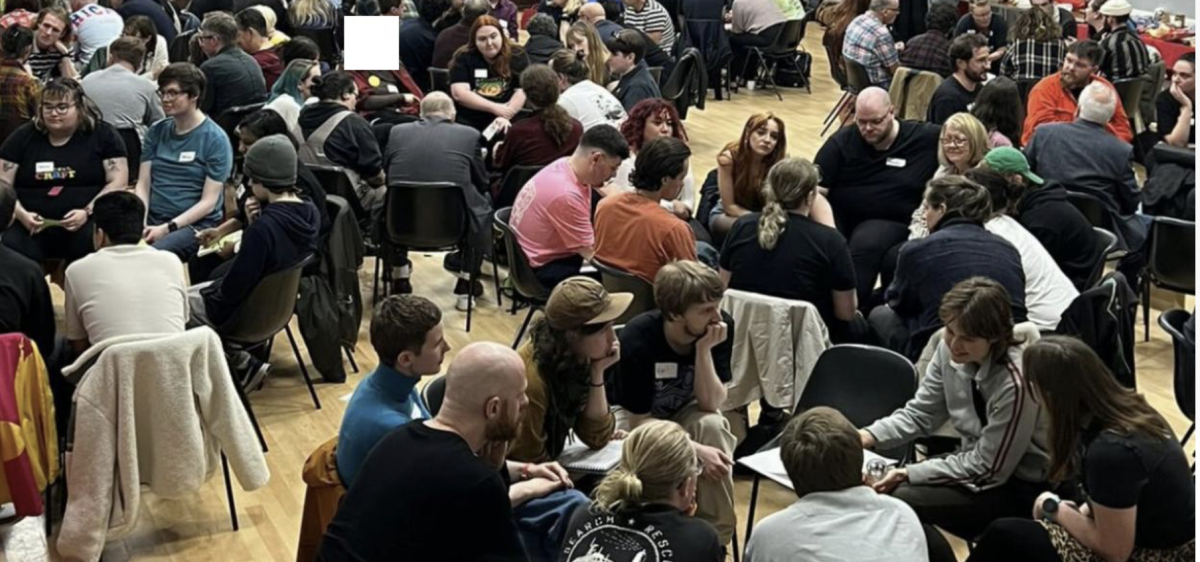
After-party: Your Party Glasgow initial public meeting
Jan B •Jan B reflects on the first ‘Your Party’ public meeting in Glasgow.
There was a public meeting of about 200 Your Party Glasgow supporters on Friday, 5 September organised by volunteers from the WhatsApp group, including myself. Tickets (required because of worries over venue and facilitation team capacity) ran out within 24 hours. There were also plenty of people who showed up without tickets.
The meeting began with a short ‘working agreement’ introduction, was followed by a speech composed of peoples’ online submissions. 20 groups of 10 people then discussed what drew them to Your Party personally, and what they think is most important to face up to locally and nationally. Some music played, then people engaged in 15 topical discussions – from working class engagement, to party democracy, to climate crisis and international solidarity—chosen by the facilitators in a chaotic but fun 15 minute deliberation, based on what they’d heard earlier in the first discussion section. At the end of the second discussion, each group elected a spokesperson to come up and make a short statement. The meeting cheered loudly and softly in response to different points and proposals. In the background, a few volunteers and journalists were interviewing attendees, taking photos and videos. Final applause and pack up closed the night.
1. Reflections on a decent meeting
Who showed up?
I’ve had my suspicions about who’s interested in Your Party. There are 800,000 signups across Britain, a least 65,000 in Scotland, and probably over 6,000 in Glasgow alone. But I hadn’t met many locals to talk about it, until last night.
A political gathering is a good opportunity to test your suspicions against reality, and use all your senses to recognise what’s shared, and what’s not, and what realistic possibility there is for collaboration. In the context of a national political founding process, public gatherings form priceless memories in people – a trustable experience with faces and names behind it – beyond a cold conceptual idea derived from gossipy headlines and leaders’ statements. By gathering around the banner of Your Party, I think most people have learned that they are not moving alone in the world. In fact, the folk who showed up seem to share a surprising degree of affinity for a radical, liberatory horizon.
Who showed up? A healthy mix of younger and older people, some politically organised, many not. Lots of folk who are sick of this system, the injustice of it domestically and internationally, politically and economically, sick of the old regime, its media and politicians and parties. Aghast at the apparent death of empathy and solidarity. Socialists, abolitionists, antifascists, anti-Zionists, mostly those in solidarity with trans people and migrants, looking for a coherent vehicle out of this mess. If they’re sceptical of ‘identity politics’ (e.g. trans solidarity), what they mean is they’re scared that the public will buy the far right line that Your Party is ‘obsessed with gender’ and conclude that they aren’t for class politics or ‘bread and butter issues’. But my conclusion, after talking with the few people who felt this way, is that they’re amenable to the argument that solidarity with oppressed groups is inseparable from the fight against exploitation, for class liberation. Some want the right political leadership to lead them, others were frustrated that this didn’t exist already; most want to get to work themselves.
The idea that such an organised movement of committed, principled people actually exists—amongst you!—is a source of energy and hope in itself. It’ll be a victory by itself for many more people in the city and across Scotland to realise this for themselves through experience.
Who organised it?
On a practical level, the meeting was a pleasure to organise. A big public Whatsapp group spawned a smaller, self-selecting ‘Public Meeting Working Group’ chat. From there, people volunteered to meet up in person. The seven or eight core volunteers proved to be collegiate—mostly independents, some with a history of political action and organising, one or two belonging to political organisations. The synthesis of different peoples’ hopes and ideas for the evening produced something better than any single political group would likely have produced. It was stressful to take on the responsibility, but in practice everyone put in a lot of work. As someone pointed out, the vibe was good and no one left halfway through. We ought to share what this work entailed. It could be published on yourparty.tools. Other Your Party supporters in Glasgow, Scotland and beyond could critically learn from that for their own organising.
There was angst about democratic remit. We were all self-selecting volunteers. But right now that’s just how it goes: if you seize the initiative, work transparently, keep the door open to others’ involvement, regularly make opportunities for feedback, and work together in a comradely manner without overstepping, things get done without sacrificing the spirit of democracy. You might say this is the founding mythos of Your Party: democracy makes leaders of those who do the work.
Now the assembly organising group finds itself in practical control of the Instagram, with a list of emails and contacts, and all the notes and photos from the day, and with some assumed authority based on having organised something. We should do a good job of wrapping up our responsibility:
- Before any more meetings are planned, we should make sure that all the photos, videos, interviews and notes of what people said are packaged up and circulated to people — someone suggested an evening gathering with some food and laptops to do that.
- There were also ideas for a post-meeting evaluation survey. I’d suggest we also gather action ideas and some basic demographic information too—for example, are there lots of supporters in particular parts of town, or in key industries, or lots of parents at particular schools?
The final challenge for us as an organising group is to ensure that the position we’ve accrued through the organising work so far doesn’t veer into unjustified leadership, which could become a bottleneck for the broader coalition of supporters, individuals and organisations both, from developing Your Party past what was started on Friday. We should return the question of ‘what next’ back to the wider movement.
2. Three political and operational questions
How can we get more comrades into the party?
It was good to see comrades from different movements at the meeting. Getting involved in Your Party is an open goal for radicals and revolutionaries of all stripes: a chance to chat with many un-organised leftists about shared sentiments, political principles and ideas, and to develop those into practical plans. In the closing section, spokespeople from the thematic discussions got up to make their statements. We heard how Palestine solidarity activists connected international solidarity with anti-imperialism and anti-racism; trans liberation was linked to class liberation; anti-fascism was linked to a programme for socioeconomic change. A lot of these perspectives come from comrades doing good organising, thinking it through and working it out. Now the value of converging and integrating these perspectives with sections of the general public who share their sympathies is obvious.
What does a socialist national organising programme look like?
People seemed keen to crack on and do something. But we can’t do this willy-nilly. Status quo thinking will take us down the path of status quo electoralism, policy reformism, continued leadership by the existing politician class, blunt idea-selling on the doorstep and the danger of simple flag-waving partisanship. We’re working towards system change amidst an organised far right, a whole capitalist class of bosses, managers and ideologues, and a whole old regime of journalists, politicians, bureaucrats, celebrities, local leaders, the carceral justice system, aristocrats and royal bootlickers. We need to develop a solid political strategy and an organising programme, which can synthesise the pull towards Scottish parliamentary elections in 2026; to grassroots action in the general sense; to anticapitalism, democracy, solidarity and self-determination in principle; and to the necessity of building durable power over time.
Emphatically, we do not need a strategy and organising programme that is completely reliant on election-time gambling. Rather, we need a strategy and organising programme that incrementally develops autonomous, durable, working class counter power across the city and beyond. We can recognise elections as a good opportunity in service of that broader goal. Winning or losing isn’t about the election result, but rather about the coalitions and influence we build that will re-shape society whatever the ballot result.
A good organising programme can cohere a nascent party and its tentatively interested proto-membership together, politically, socially and practically. We need to build a dynamic, constructive party movement that can reliably take us somewhere historically new.
How will Scotland take charge of its own party founding?
The demand for national self-determination and party autonomy is palpable. But the English Your Party lot are currently being treated as the driving force of party founding. That does not need to be the case. There are plenty of elements in Scotland that could collectively steward formation processes here and allow for a more equal negotiation with comrades in the rest of Britain.
This process could include semi-organised formations such as the Platform for Socialism & Independence, and the Scottish Left Alternative, but will also require the continued gathering and relationship-building of Scotland’s many Your Party supporters.
3. What next? Some sketches
This is a political movement beyond the existing way of things, for a new kind of party, and for systemic change—by way of maximum democracy, maximum solidarity and collective action.
The below are some personal sketches, written after the meeting, based on personal thinking and conversations with others, including comrades in rs21. What will be valuable is for more comrades to share more ideas and proposals, to fuel a productive debate over approach, and to enable synthesis in decision-making. Ultimately, we’re all looking to develop ideas into strategic organisation and enthusiastic collective action.
Grievance gatherings and public assemblies
Your Party will live or die by its mass engagement and we should start moving outwards, give away ownership of the party. I’d like to support the running of a grievance gathering programme across the city. This would recruit supporters to start working together practically, and get us speaking with many more people, about their personal, local and national concerns. Knocking doors, running stalls, hosting neighbourhood, community and workplace meetings.
Supporters are free to crack on with this, but we can also collectively organise into action through structured onboarding, training and skill exchange and debriefing. The intention is absolutely not to turn conversations into scripted activities that ‘make a sell,’ but rather to build supporters’ confidence in conducting politically-sensitive and emotionally honest conversations: listening for the material heart of the matter, of need and want, rather than fixating on the signifier solutions that people grip on to out of fear.
Grievance gathering can lead to the identification and development of early key demands into participatory campaigns around which we can gather many more people to build power and collectively fight for change. Imagine gatherings of teachers and parents to discuss the state of things and what radical, principled change might look like, followed by invitations to organise together under the banner of Your Party, with the support of many other supporters across the city and beyond? A practical, political focus will give supporters an external orientation around which party decisions can be made, avoiding the danger of static, navel-gazing party politicking.
This approach will also help to build popular awareness of Your Party as a practical vehicle for working class people to participate in, and do the practical work of affirming their instincts that our shared, material concerns can be addressed—crucially—by leaning on our basic principles of justice and solidarity and by democratic, collective action. The goal is to develop a popular appreciation that there is, in fact, a credible alternative to the disgusting, cynical compromises sold by capitalist-bootlicking, racist, transphobic far right agitators. A message to popularise is that we don’t need to throw working class people—including migrants and trans people—under the bus in order to win justice: we need more solidarity, and systemic change, instead.
Keeping our eye on the ball—doing everyday democracy, identifying maximum solidarity, and working together to build power and fight for change—will provide fuel for developing Your Party in Scotland. It can also help us clarify an approach to election campaigning that maintains a focus on the power and autonomy of the people, above the state and bigwig politicians.
Local and city organising structures
If we want new political leadership, we need to build it ourselves. Working together and separately go hand in hand.
We need to build infrastructure. This might start with a city supporters’ bulletin. News needs to start circulating across the supporter base: how can people learn what others are doing and learning, to take inspiration that can spark their own initiative? This might include an email/WhatsApp/social media/website bulletin. It might be something that supporters can provide submissions to.
I’d like to see neighbourhood gatherings, next, after this city-wide one. Many more supporters are going to have to start gathering themselves to ask: what next, for us? How do we carry the spirit of this movement forwards where we live? By taking responsibility for gathering and organising supporters in their own areas, people learn basic organising skills and build denser networks of relationships: we will need this kind of dense, collective leadership in spades for the months and years ahead. The organisers of the Friday assembly, and comrades across the city in different movements, can encourage and support people to organise neighbourhood supporter gatherings, as well as gatherings based on shared employment or social situation—e.g. healthcare workers, teachers and parents.
Future city-wide assemblies could be gatherings of delegates from local groups (of neighbours, but perhaps also of industrially or socially organised fractions, too) to discuss proposals and approaches to coordination. This ‘spokes council’ approach could be a solution to the problem of big numbers and small venue space, and the practical limitations of a ‘one big all-members meeting’ approach to organisation. It might encourage people to collectively develop proposals for action, and request mandates and resources for people and teams to get on with things.
For example, future city-wide assemblies could mandate city-wide working groups, giving them a democratically-decided remit and access to resources in order to get supporters working. This might include a facilitation group made responsible for facilitating decision-making in the city assemblies themselves, a communications group, and a grievance gathering group responsible for supporting volunteers in running outreach, including training, debriefing and sharing what is learned.
A nationally autonomous party
As we develop Your Party in Glasgow, we should advocate for what we want to see of the party across Scotland. How can we enable party supporters in other villages, towns and cities to organise themselves and then come together at a national level? Could a series of outreach, gathering and delegation-forming steps lead to a future national convention in Scotland? Can a body come together to support that development? The alternative is that this will be left to just the English.
For now
This coming week the volunteer group that organised Friday’s gathering will get together to mop up its outstanding responsibilities. What next? That’s up to everyone who wants Your Party to be a success in their eyes.

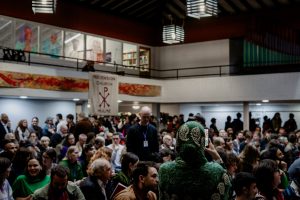
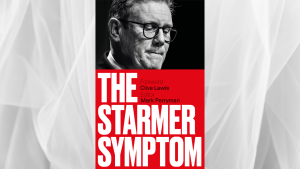
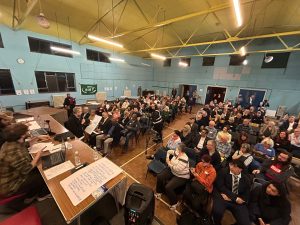




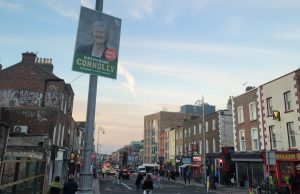

0 comments